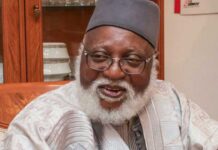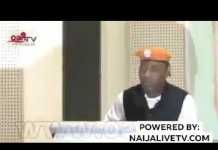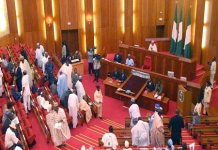
I was going to swear on the graves of my parents this week, that before the end of this administration which is less than a year away, the Social Media Bill would mutate in another variant. This is because the engine of politics is revving loud across the nation and so many things would likely be washed up in the campaign process. And these things need to be kept away from the eyes of prying Nigerians as untruth.
Fairly acquainted with that was the knowledge that some parastatals have been meeting at the Nigerian Communications Commission (NCC) to perfect a document that could accommodate this government’s position on social media.
In clear display of irony, while the Nigerian Government officials led by the President, Muhammadu Buhari was still attending the parade in Abuja, the Federal Capital Territory, a parastatal of government, the National Information Technology Development Agency (NITDA) released a document to put the operations of social media in a bind.
Oh NITDA would have to hide the unsavoury development under some gobbledegook. Titled, CODE OF PRACTICE FOR INTERACTIVE COMPUTER SERVICE PLATFORMS/INTERNET INTERMEDIARIES, the code hides its intentions under some some skillfully laid out plans to hamstring organisations and individuals that could affect government’s faltering run to a conclusion.
The objectives of the 11-page draft Code of Practice are as follows:
a.Set out best practices required of Interactive Computer Service Platforms/Internet Intermediaries.
b. Set out best practices that will make the digital ecosystem safer for Nigerians and non-Nigerians in Nigeria.
c. Set out measures to combat online harms such as disinformation and misinformation.
d. Adopt and apply a co-regulatory approach towards implementation and compliance.
However the intentions are betrayed in the definition of the first objective. Look at the definitions below.
Interactive Computer Service Platforms,” otherwise referred to as a Platform in this Code, means any electronic medium or site where services are provided by means of a computer resource and on-demand and where users create, upload, share, disseminate, modify, or access information, including websites that provide reviews, gaming Platform, online sites for conducting commercial transactions.
“Internet Intermediary” otherwise referred to as a Platform in this Code, include, but not limited to, social media operators, websites, blogs, media sharing websites, online discussion forums, streaming Platform, and other similar oriented intermediaries where services are either enabled or provided and transactions are conducted and where users can create, read, engage, upload, share, disseminate, modify, or access information.
Although put together by the parastatals of the Ministry of Communications and Digital Economy and the Ministry of Information and Culture, those who run foul of truth as defined by the Code would have to be judged by the contents of several Acts which include: The Communications Act; National Broadcasting Commission Act; Nigeria Broadcasting Code; Cybercrimes (Prohibition, Prevention, etc.) 2015; Advance Fee Fraud and other Fraud Related Offences Act 2006; Nigeria Data Protection Regulation 2019; Advertising Practitioners Act 2004;
8. Sales Promotions of Nigerian Code of Advertising Practice Sales Promotion and other Right/Restrictions on practice Act 2004;Terrorism Prevention Amendment Act 2022; NCC Consumer Code of Practice Regulations 2017; Federal Competition and Consumer Protection Act (FCCPA) 2018; among others.
Recall there was an outrage when the Alhaji Lai Mohammed hid under a new Broadcast Code to tamper with the freedom of the broadcast industry and the operators social media. Titled Nigeria Broadcasting Code 6the Edition, the Code was thrashed by a High Court towards the end of May. The judgment by Justice Ambrose Lewis-Allagoa thrashed the Code for its incompetence.
An industry voice called this development yesterday as forum shopping saying the government was only trying to reincarnate a document that has already been dealt a death blow by the court.
Head Corporate Affairs and External Relationship of NITDA, Hadiza Umar, who released the code yesterday said: “The new global reality is that the activities conducted on these Online Platforms wield enormous influence over our society, social interaction, and economic choices, hence, the Code of Practice is an intervention to recalibrate the relationship of Online Platforms with Nigerians in order to maximise mutual benefits for our nation, while promoting a sustainable digital economy.”
But media practitioners and some Information and Communications Technology ICT professionals did not buy the message.
President,Nigerian Guild of Editors, Mustapha Isah, said: “Thank God the code remains just a draft. The Nigerian Guild of Editors will resist any attempt to hide under any law or code of conduct to limit media freedom.
“Asking online platforms to provide a comprehensive compliance mechanism to avoid the publication of unethical behaviour seems to be a booby trap. Who defines the unethical behaviour? NITDA should do more consultations on this. All the various stakeholders must agree on what unethical behaviour is to avoid ambiguity which could be used against online platforms perceived to be unfriendly to government”.
Chairman Lagos State Chapter, Nigerian Union of Journalists, NUJ, Mr Adeleye Ajayi said: “The Code of Practice for online practitioners and other operators of computer networks issued by NITDA came as a shock to the media. It is a shock because it is coming at a time the media is yearning for Press Freedom and considering the fact that the media is already guided by a code of ethics.
“The directive requesting for comprehensive compliance mechanism including the legal and tax hurdles are conditions which might be difficult to meet by online operators.
“NITDA should have called a stakeholders’ forum to address all these issues before coming up with the code of practice and other directives.
“We should not forget that the media did a lot right from the First Republic, the Second Republic and till today to restore and sustain the nation’s democracy.
“The media, therefore, should always be carried along by government when policy decisions that concern it are to be put in place.
“The media is undoubtedly the fourth estate of the realm and as watchdogs of the society, should be given adequate room to operate.
“I will advise that an urgent meeting of stakeholders be convened to address issues that concern online practitioners for exhaustive interaction and seamless operations by all parties”.
An IT practitioner and Executive Director Paradigm Initiatives of Nigeria, PIN, Mr Gbenga Sesan said: “The Code of Practice is an exercise in futility, or at best, another failed attempt at backdoor regulation. As NITDA and others have been told, if Nigeria is really serious about regulation in terms of standards, and not political control over free speech, they should proceed to the National Assembly with a Bill. Until then, these efforts will only continue to make Nigeria a laughing stock”.
Kindly contact us @ Naijalivetv@gmail.com
Call or Whatsapp: 07035262029, 07016666694, 08129340000









